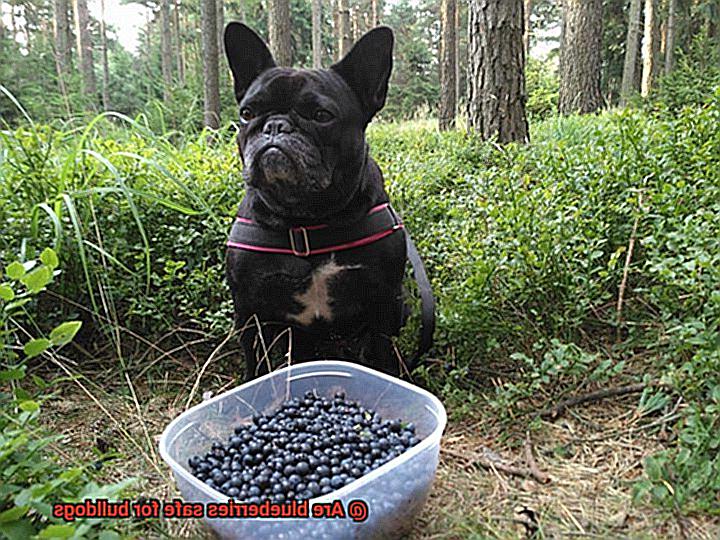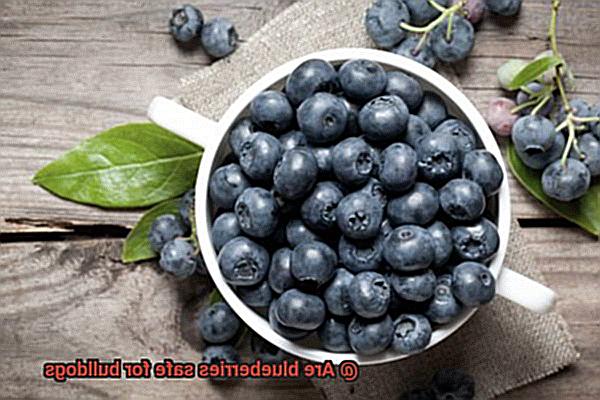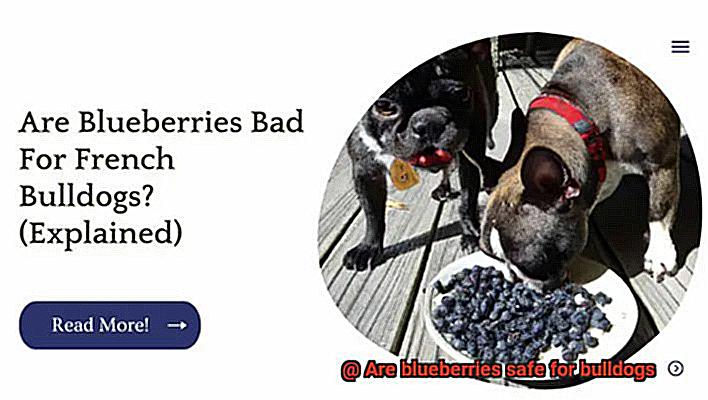Are blueberries safe for bulldogs?
We all know that keeping our furry friends happy and healthy is top priority. And when it comes to their diet, we’re always on the lookout for tasty treats that won’t send them running for the hills (or the vet’s office). But what about blueberries? These little balls of goodness are hailed as nutritional powerhouses for humans, but can they hold their own in the bulldog world?
In this blog post, we’re tackling the great blueberry debate head-on. We’ll dig into whether these vibrant berries are safe and beneficial for your beloved bulldog or if they should be left on the shelf. And hey, we’ve even got some expert opinions from veterinarians to help us separate fact from fiction. So, whether you’re considering adding a touch of berryliciousness to your pup’s bowl or just curious about what’s safe for them to munch on, keep reading because we’ve got all the juicy details.
Now, before we dive in, let’s remember that every dog is different. What works for one may not work for another. That’s why it’s always a good idea to consult with your trusted veterinarian before making any dietary changes. Alrighty then, grab a handful of blueberries and let’s embark on this fruity adventure together.
Nutritional Benefits of Blueberries for Bulldogs
Contents
- 1 Nutritional Benefits of Blueberries for Bulldogs
- 2 Potential Health Risks of Feeding Blueberries to Bulldogs
- 3 Moderation and Safety Guidelines for Feeding Blueberries to Bulldogs
- 4 How to Prepare Blueberries for Your Bulldog
- 5 Allergic Reactions in Bulldogs After Eating Blueberries
- 6 Bulldog Breeds That Can Benefit from Eating Blueberries
- 7 Alternatives to Feeding Blueberries to Bulldogs
- 8 Conclusion
If you’re looking for a nutritious and delicious treat for your furry friend, look no further than blueberries. These tiny powerhouses are not only packed with flavor but also offer a range of health benefits for your beloved bulldog. So, let’s dive into the nutritional wonders that blueberries bring to the table.
Vitamins Galore:
Blueberries are bursting with essential vitamins that can support your bulldog’s overall health. Vitamin C acts as a natural immune booster, helping to ward off illnesses and keep your bulldog feeling their best. Additionally, vitamin K is vital for blood clotting and bone health, keeping your pup strong and agile.

Mighty Manganese:
Don’t let their size fool you – blueberries are loaded with manganese, a mineral that plays a crucial role in carbohydrate, protein, and fat metabolism. This powerhouse mineral ensures that your bulldog’s body functions optimally.
Antioxidant Avengers:
Blueberries are brimming with antioxidants, which act as superhero defenders against harmful free radicals in your bulldog’s body. These antioxidants can support brain health, reduce inflammation, and even help prevent certain diseases. Talk about a tasty way to protect your pup.

Fiber Fantastic:
Is your bulldog struggling with digestion or constipation? Blueberries can come to the rescue. The fiber content in blueberries promotes healthy digestion and helps prevent any unwanted tummy troubles. Keep those tails wagging.
Hydration Heroes:
With their high water content, blueberries can contribute to keeping your bulldog hydrated, especially during those hot summer months. A juicy blueberry snack is not only tasty but also a refreshing way to quench your pup’s thirst.
Calorie-Conscious Delight:
If you’re watching your bulldog’s weight, blueberries are a guilt-free treat option. Low in calories and fat, these little berries can satisfy your pup’s sweet tooth without packing on the pounds.
Potential Health Risks of Feeding Blueberries to Bulldogs

Well, while blueberries are often seen as a superfood for humans, it’s important to be aware of potential health risks when feeding them to our beloved bulldogs. Let’s dig into the potential dangers and how to keep your pup safe.
Choking Hazard: Handle with Care
Did you know that bulldogs have adorable but unique snouts? Their short noses and narrow airways make them more prone to choking on small objects like blueberries. To avoid any accidents, consider cutting blueberries into smaller pieces or opting for larger fruits that are easier to chew.
Sugar Content: The Sweet Dilemma
Bulldogs have a tendency to gain weight easily, so sugar control is crucial. While blueberries are relatively low in sugar compared to other fruits, it’s still important to moderate their intake. Too many sweet treats can lead to weight gain and possibly worsen existing health conditions like diabetes. Everything in moderation, folks.
Sensitive Stomachs: Proceed with Caution
Sensitive stomachs are no fun for anyone, especially our furry friends. Introducing new foods like blueberries can sometimes upset a bulldog’s digestive system, leading to tummy troubles or diarrhea. Start small and observe how your pup reacts before making blueberries a regular part of their diet.
Pesticide Residue: Go Organic.
When it comes to fruits, pesticide residues can be a concern. While blueberries are undeniably tasty, they’re often grown using pesticides and chemicals. Opting for organic or pesticide-free blueberries can help reduce the risk of exposing your bulldog to harmful substances that may cause allergies or sensitivities.
Allergic Reactions: Listen to Your Bulldog’s Body
Just like humans, some bulldogs may have specific allergies or sensitivities to certain fruits, including blueberries. Keep a close eye on your pup after feeding them blueberries. If you notice any itching, swelling, or gastrointestinal distress, it’s best to consult with a veterinarian.
Moderation and Safety Guidelines for Feeding Blueberries to Bulldogs
French Bulldogs are beloved companions known for their unique charm and playful nature. As responsible pet owners, it’s essential to understand the moderation and safety guidelines when feeding blueberries to our furry friends. In this article, we will discuss the importance of moderation, potential risks, and how to safely introduce blueberries into your French Bulldog’s diet.
The Power of Moderation:
Feeding blueberries to French Bulldogs in moderation is key. While blueberries are packed with vitamins, minerals, and antioxidants, excessive consumption can lead to digestive issues such as diarrhea or upset stomach. Start by offering a small amount and gradually increase the serving size over time.
Monitoring for Adverse Reactions:
Every French Bulldog is unique, and it’s important to monitor for any adverse reactions or allergies when introducing blueberries. Begin by giving a few mashed or chopped blueberries and observe how your pup’s body reacts. If there are any signs of discomfort such as vomiting or diarrhea, discontinue feeding blueberries and consult your veterinarian.
Preventing Choking Hazards:
Bulldogs have a tendency to gulp down their food quickly, so it’s crucial to chop or mash blueberries into smaller pieces before offering them. This minimizes the risk of choking hazards and ensures safe consumption.
Consult Your Veterinarian:
Before making any significant changes to your French Bulldog’s diet, consult with a veterinarian. They can provide personalized advice based on your dog’s specific health needs and dietary requirements.
Sourcing High-Quality Blueberries:
Opt for high-quality blueberries that are free from pesticides or harmful chemicals. Organic blueberries are a great choice as they minimize the risk of exposing your French Bulldog to potentially harmful toxins.
Blueberries as Treats or Supplements:
Remember that blueberries should be served as a treat or supplement to your French Bulldog’s balanced and complete diet. They should not replace essential nutrients provided by regular dog food.
How to Prepare Blueberries for Your Bulldog
Blueberries are not only delicious but also packed with vitamins and antioxidants that can boost your bulldog’s health. However, it’s important to know how to properly prepare this tasty treat to ensure the safety and enjoyment of your furry friend. So, let’s dive in and learn how to prepare blueberries for your bulldog.
Selecting Fresh and Ripe Blueberries:
When buying blueberries for your bulldog, choose firm and plump berries with a deep blue color. Avoid mushy or moldy ones as they might not be safe for your pet. Remember, fresh and ripe blueberries are key to providing the best flavor and nutritional benefits.
Thoroughly Washing the Blueberries:

Before feeding blueberries to your bulldog, make sure to wash them thoroughly. Use clean water and gently rinse the berries under running water. This will remove any dirt, pesticides, or other contaminants that may be on the surface.
Cutting into Smaller Pieces:
Bulldogs have strong jaws, but it’s best to cut blueberries into smaller pieces to make it easier for them to chew and digest. This will also reduce the risk of choking, especially since bulldogs tend to gulp their food. You can use a knife or mash them slightly with a fork to create a softer texture.
Blending or Freezing for Extra Fun:
If your bulldog has dental issues or difficulty chewing, you can blend the blueberries with a small amount of water or plain yogurt to create a smooth puree. This will make it easier for them to lick up their tasty treat. Additionally, frozen blueberries can be a refreshing snack during hot summer days or provide relief for teething puppies.
Moderation is Key:
While blueberries are safe for bulldogs, it’s important to serve them in moderation. Blueberries should be given as a treat or supplement to their regular diet. Overfeeding can lead to digestive issues or weight gain. Talk to your veterinarian about the appropriate portion size for your bulldog based on their size, age, and overall health.
Allergic Reactions in Bulldogs After Eating Blueberries
Bulldogs are adorable and lovable pets, but they often have sensitive digestive systems. As a responsible owner, it’s crucial to be aware of potential allergic reactions that your bulldog may experience after eating blueberries. While blueberries are generally safe for dogs and are even included in many commercial dog foods as a healthy ingredient, some bulldogs may develop allergies to this fruit.
Signs of Allergic Reactions
It’s important to be vigilant and watch for any signs of allergic reactions in your bulldog after they eat blueberries. Common signs include:
- Itching: Bulldogs may start scratching or biting their skin excessively.
- Swelling: Their face, lips, or tongue may become swollen.
- Hives: Raised bumps or welts may appear on their skin.
- Vomiting: Bulldogs may experience nausea and vomit after consuming blueberries.
- Diarrhea: Loose stools or diarrhea can be a sign of an allergic reaction.
- Difficulty Breathing: In severe cases, bulldogs may have trouble breathing.
Prevention Tips
To prevent allergic reactions in your bulldog after eating blueberries, consider the following tips:
- Start Slowly: Introduce blueberries into your bulldog’s diet gradually and in small amounts to monitor their reaction.
- Watch for Symptoms: Keep a close eye on your pet after they eat blueberries and look for any signs of an allergic reaction.
- Consult Your Veterinarian: If you notice any adverse symptoms or suspect your bulldog has an allergy to blueberries, consult your veterinarian for guidance.
- Allergy Testing: In some cases, your veterinarian may recommend allergy testing to determine if your bulldog has a pre-existing allergy to blueberries or other fruits.
- Eliminate Blueberries: If your bulldog is diagnosed with a blueberry allergy, it’s important to remove blueberries entirely from their diet to prevent further allergic reactions.
- Limit or Cook Blueberries: In mild cases, limiting the amount of blueberries given to your bulldog or cooking them before feeding may help reduce the risk of allergic reactions.
Remember, every bulldog is unique, and while blueberries are generally safe, some may have sensitivities or allergies. It’s essential to monitor your pet’s health closely when introducing any new food into their diet. Your veterinarian is your best resource for personalized advice and guidance on managing allergies in your bulldog.
Bulldog Breeds That Can Benefit from Eating Blueberries
We know how much you love your wrinkly-faced companions, and we want to help you keep them happy and healthy. One way to do that is by incorporating blueberries into their diet. In this article, we’ll dive into the many benefits that blueberries can provide to bulldog breeds, including French Bulldogs. So let’s get started.
Allergy-friendly Treats:
Bulldogs, including French Bulldogs, are prone to allergies. Finding suitable treats can be a struggle, but blueberries come to the rescue. These berries are hypoallergenic, meaning they’re less likely to cause allergic reactions compared to other fruits or foods. Your bulldog can enjoy these tasty treats without the worry of adverse reactions.
Weight Management Support:
Maintaining a healthy weight is crucial for bulldogs to prevent joint problems and other obesity-related health issues. Luckily, blueberries are low in calories but high in fiber. This delightful combination helps promote feelings of fullness while providing essential nutrients. So go ahead and treat your furry friend to some blueberry goodness while keeping their waistline in check.
Dental Health Aid:
Bulldogs often face dental problems such as gum disease and tooth decay. Regular dental care is essential for their oral health, and blueberries can play a part too. The natural tartness of blueberries can help remove plaque buildup on their teeth. However, remember to offer blueberries in moderation since they do contain natural sugars.
Antioxidant Powerhouse:
Bulldogs may be more prone to certain health conditions like cancer and heart disease. That’s where the antioxidants in blueberries come in handy. These powerful compounds help protect the body against harmful molecules known as free radicals. By incorporating blueberries into their diet, you provide your bulldog with a natural source of antioxidants to support their overall well-being.
Alternatives to Feeding Blueberries to Bulldogs
If you’re looking for alternative fruits and vegetables to add to your bulldog’s diet, we’ve got you covered. In this section, we’ll explore some delicious and nutritious options that can provide similar health benefits to blueberries.
Strawberries:
Strawberries are a fantastic alternative to blueberries. Like blueberries, they are low in calories and rich in antioxidants. They can be served as whole fruits or mashed up and mixed with your bulldog’s regular food. Just make sure to remove the stems before feeding them to your furry friend.
Pumpkin:
Pumpkin is an excellent source of dietary fiber and can aid in digestion. It’s important to use plain, unsweetened pumpkin puree without any added sugars or spices. You can feed your bulldog cooked or canned pumpkin as a treat or mix it with their regular food.
Sweet Potatoes:
Sweet potatoes are packed with vitamins and minerals, including vitamin A, which promotes healthy skin and coat. You can cook sweet potatoes and mash them up to serve as a tasty treat or mix them with your bulldog’s regular food.
Carrots:
Carrots are low in calories and high in fiber, making them great for weight management in bulldogs. They also help promote dental health by naturally cleaning your bulldog’s teeth as they chew on them. Serve carrots raw or cooked, cut into small pieces for easy chewing.
Apples:
Apples are rich in vitamins A and C and provide a satisfying crunch that can help maintain your bulldog’s dental health. Remember to remove the seeds and core before feeding apples to your bulldog.
2Cueo4kTskg” >
Conclusion
In conclusion, blueberries can be a safe and beneficial addition to your bulldog’s diet. These little powerhouses are bursting with vitamins, minerals, antioxidants, and fiber that can give your furry friend an extra boost of health. From immune-boosting vitamin C to digestion-promoting fiber, blueberries offer a wide range of nutritional benefits that can support your bulldog’s overall well-being.
But remember, every dog is unique, so what works for one may not work for another. It’s always wise to consult with your veterinarian before making any changes to your bulldog’s diet or introducing new foods.
While blueberries are generally safe for bulldogs, there are some potential health risks you should be aware of. Bulldogs have distinctive snouts that make them more susceptible to choking on small objects like blueberries. To prevent any mishaps, it’s crucial to cut the berries into smaller pieces or opt for larger fruits that are easier for them to chew. Additionally, bulldogs have a tendency to pack on the pounds easily, so it’s essential to moderate their intake of sugary treats like blueberries.
Overall, when given in moderation and with proper precautions, blueberries can be a nutritious and lip-smacking delight for your bulldog.




